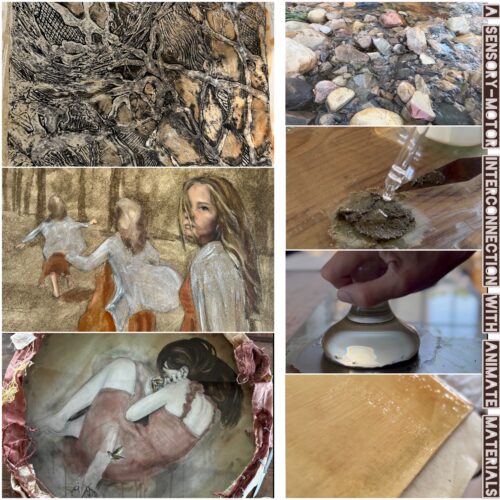
OCA Wellbeing: A trip to the bibliotherapist
The response to Helen’s post last week was great, thank you! This week we have another example that can be done within the comfort of your own home.
Imagine going to the doctor’s and coming out with a prescription – for a good book.
It’s really not as daft as it may sound. And what’s more, the notion that our mental wellbeing can be improved by something other than pills is far from new.
There’s a great section near the beginning of Three Men in a Boat by Jerome K. Jerome where the narrator visits his doctor because he’s just not feeling all that great. He’s done that inadvisable thing – he’s looked up his symptoms – and convinced himself that he’s about to expire. The narrator chats this through with the doctor and leaves with a prescription in his pocket. He hands it to a chemist who says he can’t help. Why? Because the doctor advises beefsteak, beer, regular bedtimes and walking. This sets the whole comic premise of the author and his friends heading off on their boat trip (it’s a short and very funny read, if that’s just what you need right now – my link takes you to a free online copy). Three Men in a Boat was published in 1889.
We can’t take off on a boat right now (or not at the time of writing). But we can give our minds a treat and reading often does this for us. Sydney Timmins is a mental ill health survivor and in 2018, she wrote a piece for Mental Health First Aid England giving her reasons why reading can ease our minds. You can read the whole thing here and I don’t want to repeat it but there are some key points to pull out.
- Reading brings your heart rate down: fact. (I’m assuming they mean books rather than newspapers, which could well have the opposite effect). And you only need to do it for six minutes to reduce stress, according to experts.
- Reading makes you smarter. That’s less of a surprise, but the research backs it up.
- Reading’s an escape from the real world. And do we need that!
I haven’t invented the term ‘bibliotherapy’, by the way (though I wish I had). It’s been a recognised approach since 1916, using reading, storytelling and creative writing as therapy in individual and group sessions. It’s even broken down further, as you can find a poetry therapist, for example, or you can try a specific form of bibliotherapy based on how you identify with characters in a book. And yes, you actually can get a book on prescription and it’s just as useful for children.
If all this fascinates you and you want to delve a little further into books and reading as therapy, then here are some suggestions:
- A BBC podcast on bibliotherapy: https://www.bbc.co.uk/news/av/disability-44171404/bibliotherapy-a-novel-take-on-mental-health
- The Mental Health Bookclub podcast: https://www.mentalhealthbookclub.com/
- Michael Rosen’s Sad Book (2004)
And of course, let’s not forget the main reason why reading helps our mental health. It’s just great fun, isn’t it?
Do you have any mood-lifting reading recommendations? Send them to us!
|
|







I really like that word.
Reading has kept me sane during the past three months and I’m really missing the library. We watched the latest film of Jane Austen’s book “Emma” and concluded it was a parody really, so I’m reading the book again now to check and, apart from getting quite cross with Emma, I’ve been imagining her as a teenager now and thinking she’d definitely be on social media frequently. It just shows how classic books can be re-read over and over because they capture something universal that lasts over time.
I’m going to revisit Sense & Sensibility next.
That’s great to hear (and I agree with you about the latest film of Emma!). Thanks – and enjoy immersing yourself in Austen!
It is a lovely idea. It brought to mind also William Sieghert’s “The Poetry Pharmacy. Tried-and-true prescriptions for the heart, mind and soul”. In a web chat for the Guardian he dispensed poetry prescriptions for varying ailments:
https://www.theguardian.com/books/live/2017/dec/13/poetry-pharmacy-william-sieghart-webchat
I find Katherine Swift’s “The Morville Hours” soothing. She writes evocatively – in the form of a medieval book of hours – of creating a garden, journeying through the past – both recent and distant.
Thank you, that is a lovely link!
I’m not sure that reading is an escape from the real world. Well, it might be. But the importance of reading,
both fiction and poetry, is that it offers you a different view of the real world and helps you to understand the real world.
Great piece – I’ve long been an advocate of reading. Claudia Hammond’s recent book The Art of Rest has details of how therapeutic reading can be. Reading is also really good at triggering the brain waves that allow ideas to generate so whatever discipline you are studying, reading can benefit (and it doesn’t have to be a subject related book!)
Thanks for the suggestion, Andrea – good recommendation!
I was bought a book spa session at an indie Bath book shop just before surgery last year. It was an absolute joy and introduced me to some fantastic reads that I would never have encountered on my own, even though at least two of them dovetailed very neatly into my OCA studies.
That sounds fascinating – what does a book spa involve? I’d love to know more about it!